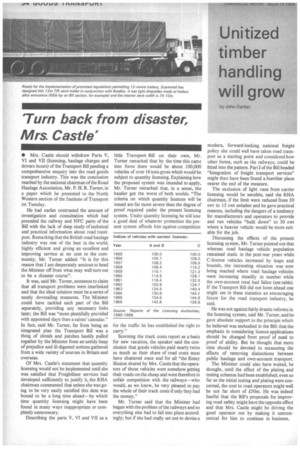'Turn back from disaster, Mrs. Castle'
Page 36

If you've noticed an error in this article please click here to report it so we can fix it.
• Mrs. Castle should withdraw Parts V, VI and VII (licensing, haulage charges and drivers hours) of the Transport Bill pending a comprehensive enquiry into the road goods transport industry. This was the conclusion reached by the national chairman of the Road Haulage Association, Mr. P. H. R. Turner, in a paper which he presented to the North Western section of the Institute of Transport on Tuesday.
He had earlier contrasted the amount of investigation and consultation which had preceded the railway and NFC parts of the Bill with the lack of deep study of technical and practical information about road tranSport. Remarking that the British road haulage industry was one of the best in the world, highly efficient and giving an excellent and improving service at no cost to the community, Mr. Turner added: "It is for this reason that I am desperately anxious to head the Minister off from what may well turn out to be a disaster course".
It was, said Mr. Turner, nonsense to claim that all transport problems were interlinked and that the ideal solution must be a series of neatly dovetailing measures. The Minister could have tackled each part of the Bill separately, providing any necessary links later; the Bill was "more plentifully provided with appointed days than a saints' calendar." In fact, said Mr. Turner, far from being an integrated plan the Transport Bill was a thing of shreds and patches hastily pulled together by the Minister from an untidy heap of prejudice and ill-digested notions gathered from a wide variety of sources in Britain and overseas.
Of Mrs. Castle's statement that quantity licensing would not be implemented until she was satisfied that Freightliner services had developed sufficiently to justify it, the RHA chairman commented that unless she was going to be very easily satisfied this date was bound to be a long time ahead—by which time quantity licensing might have been found in many ways inappropriate or completely unnecessary.
Describing the parts V, VI and VII as a little Transport Bill on their own, Mr. Turner remarked that by the time this came into force there would be about 100,000 vehicles of over 16 tons gross which would be subject to quantity licensing. Explaining how the proposed system was intended to apply, Mr. Turner remarked that, in a sense, the haulier got the worst of both worlds. "The criteria on which quantity licences will be issued are far more severe than the degree of proof required under the present licensing system. Under quantity licensing he will lose a good deal of whatever protection the present system affords him against competition for the traffic he has established the right to carry."
Scorning the track costs report as a basis for new taxation, the speaker said the conclusion that goods vehicles paid nearly twice as much as their share of road costs must have shattered once and for all "the flimsy illusion shared by Mrs. Castle that the operators of those vehicles were somehow getting their roads on the cheap and were therefore in unfair competition with the railways—who would, as we know, be very pleased to pay the whole of their track costs if only they had the money."
Mr. Turner said that the Minister had begun with the problem of the railways and so everything else had to fall into place accordingly; but if she had really set out to devise a modern, forward-looking national freight policy she could well have taken road transport as a starting point and considered how other forms, such as the railways, could be fitted into the pattern. Part! of the Bill headed "Integration of freight transport services" might then have been found a humbler place nearer the end of the measure.
The exclusion of light vans from carrier licensing would be sensible, said the RHA chairman, if the limit were reduced from 30 cwt to 15 cwt unladen and he gave practical reasons, including the dangers of a tendency for manufacturers and operators to provide and run vehicles "built down" to 30 cwt where a heavier vehicle would be more suitable for the job.
Discussing the effects of the present licensing system, Mr. Turner pointed out that whereas road haulage vehicle population remained static in the post-war years while C-licence vehicles increased by leaps and bounds, the interesting situation was now being reached where road haulage vehicles were increasing steadily in number while the own-account total had fallen (see table). If the Transport Bill did not loom ahead one might see in these statistics an encouraging future for the road transport industry, he said.
He was not against fairly drastic reforms in the licensing system, said Mr. Turner, and he gave absolute support to the principle which he believed was embodied in the Bill: that the emphasis in considering licence applications should be changed from proof of need to proof of ability. But he thought that more time should be devoted to measuring the effects of removing distinctions between public haulage and own-account transport.
The Minister could also have waited, he thought, until the effect of the plating and testing schemes had been established; even so far as the initial testing and plating were concerned, the cost to road operators might well be not far short of £50m. He was indeed fearful that the Bill's proposals for improving road safety might have the opposite effect and that Mrs. Castle might be driving the good operator out by making it uneconomical for him to continue in business.




































































































































